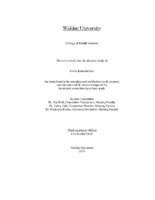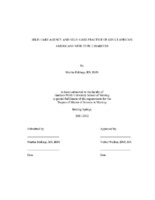Self-care management of African American men with type 2 diabetes
View File(s)
Visitor Statistics
Visits vs Downloads
Visitors - World Map
Top Visiting Countries
| Country | Visits |
|---|
Top Visiting Cities
| City | Visits |
|---|
Visits (last 6 months)
Downloads (last 6 months)
Popular Works for Konstantinos, Kevin by View
| Title | Page Views |
|---|
Popular Works for Konstantinos, Kevin by Download
| Title | Downloads |
|---|
View Citations
Citations
African American men are disproportionately affected by type 2 diabetes and have a 3 times higher rate of 3 serious complications of diabetes, including blindness, amputations, and end-stage renal disease, compared to other groups. The purpose of this project was to address the gap-in-practice disparity that exists in care of African American men with diabetes by providing one-on-one self-care management education in an outpatient clinic setting. The behavior change theories that supported the project intervention were Orem’s self-care theory and Bandura’s self-efficacy theory. Employing a quasi-experimental design, 33 participants between the ages of 40 and 65 were divided into an intervention group (n = 18) and a comparison group ( n = 15) by self-selection. Only participants in the intervention group received the diabetes self-care education program. Both groups completed pretest and the posttest questionnaires that collected demographic data and data from the Summary of Diabetes Self-Care Activities, the Diabetes Knowledge Test, and the Self-Efficacy for Diabetes tool. Statistically significant differences between the groups were found in the posttest scores of self-care activities, diabetes knowledge, and self-efficacy. The differences can most likely be attributed to the diabetes education intervention. This project demonstrated that diabetes self-care management education can be provided effectively in the clinic office setting, making diabetes education more available to and accessible for patients who need it most. Integrating diabetes self-care education into primary care providers’ offices has the potential to address the gap-in-practice that exists for African American men with type 2 diabetes and contribute to social change by preventing disease progression.
This dissertation has also been disseminated through the ProQuest Dissertations and Theses database. Dissertation/thesis number: 10747397; ProQuest document ID: 2023807794. The author still retains copyright.
This item has not gone through this repository's peer-review process, but has been accepted by the indicated university or college in partial fulfillment of the requirements for the specified degree.
| Type | DNP Capstone Project |
| Acquisition | Proxy-submission |
| Review Type | None: Degree-based Submission |
| Format | Text-based Document |
| Evidence Level | Quasi-Experimental Study, Other |
| Research Approach | Qualitative Research |
| Keywords | Minority Health Care; Diabetic Self-care; Gap in Practice |
| CINAHL Subject(s) | Self Care; Diabetes Mellitus, Type 2; Blacks; Men's Health; Healthcare Disparities; Self Care--Education |
| Grantor | Walden University |
| Advisor | Bell, Sue |
| Level | DNP |
| Year | 2018 |
All rights reserved by the author(s) and/or publisher(s) listed in this item record unless relinquished in whole or part by a rights notation or a Creative Commons License present in this item record.
All permission requests should be directed accordingly and not to the Sigma Repository.
All submitting authors or publishers have affirmed that when using material in their work where they do not own copyright, they have obtained permission of the copyright holder prior to submission and the rights holder has been acknowledged as necessary.
Related items
Showing items related by title, author, creator and subjects.
-
Self-care agency and self-care practice of adult African Americans with type 2 diabetes
Eddings, MarthaThe purpose of the study was to identify and examine the concepts of self-care agency and self-care practice of African American adults diagnosed with type 2 diabetes, living in the local community. The research questions ... -
American Association of Diabetes Educators 7 intervention in managing type 2 diabetes in older home health patients
Ohakosim, Anne N.Management of chronic disease pathologies requires the patient to have the ability to understand and manage their care. This may be especially challenging in the aging population caring for themselves at home. The home ... -
The relationships between healthy literacy and self-care of diabetic management in children with diabetes mellitus
Yang, Yi-Ling; Huang, Li-Chi; Wang, Chung-Hsing; Lee, Jo-HuaThis study will to explore the relationships between healthy literacy and self-care of diabetic management in adolescent children with diabetes mellitus, inculding Type I and Type II. -
The effectiveness of a promotora-led intervention for Mexican Americans with type 2 diabetes
Lujan, JosefinaPurpose. The purpose of this randomized control repeated measures trial was to determine the effectiveness of a self-management intervention led by community lay workers called promotoras on the health outcomes of Mexican ... -
Quality improvement: Improving type 2 diabetes self-management and A1C levels in older adult veterans using an automated message system
Brunson, DanielleBackground: Diabetes mellitus is prevalent among the US population; particularly type 2 diabetes. As the population ages, the number of adults 65 years of age or older with diabetes is increasing. Diabetes is also common ...





